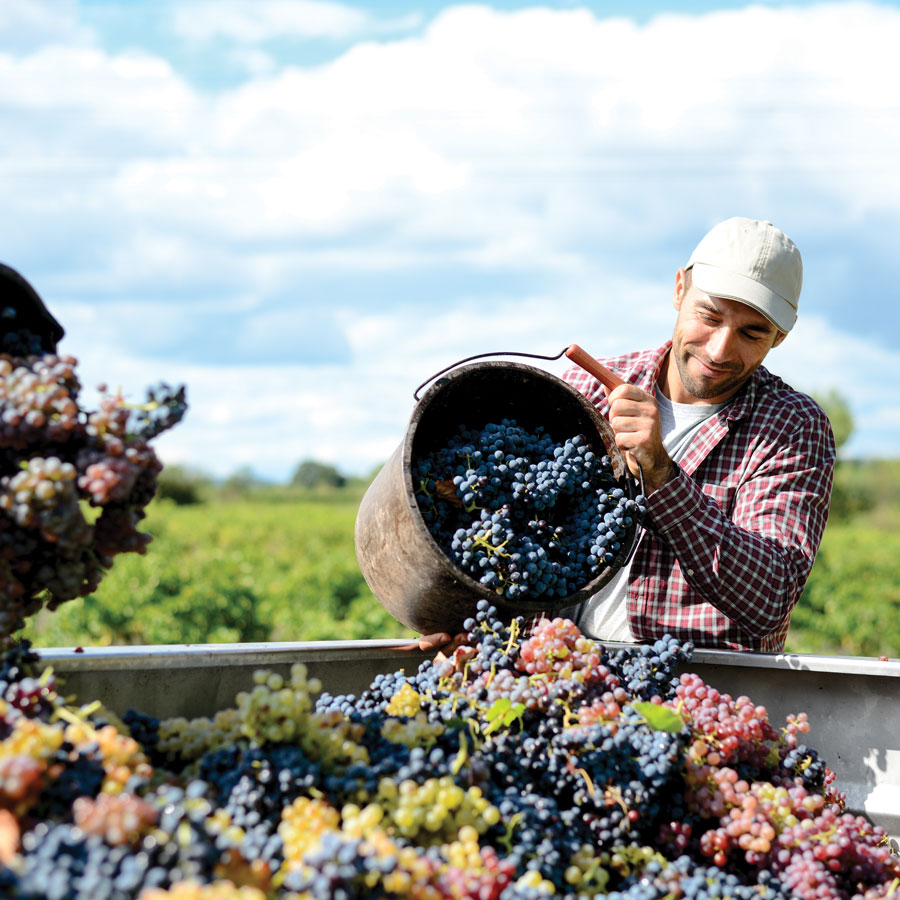A new thirst for vegan wines …
Since 2024, all wines sold in the EU must be accompanied by a full list of ingredients, either printed on their labels or communicated to consumers via dedicated electronic means, such as a QR code. This new transparency about what really goes into our wine glasses made a few waves, but helps us make more informed choices when it comes to deciding what we are happy to ingest, or not. A lot of products can be used in winemaking and additives commonly used at different stages during vinification or prior to bottling can include some of animal origin. Until that harvest, there was no legal requirement for any ingredients, apart from allergens, alcohol and sulfites, to be listed on the label. In a world more conscious than ever of the use of animal-based products, we are beginning to see the term “vegan” on wine labels. What animal products could possibly have made their way into our favourite glass of wine? Let’s take a look.
Animal products are mostly used (if used) once the wine is finished, just before bottling, during a process called “fining” that helps stabilise the wine and clarify it to make it more attractive visually. Wine fining involves stirring a coagulant substance into a wine which is still in the tank or barrel. This substance binds with small, suspended particles that can make the wine hazy and once combined, they precipitate to the bottom of the tank and then can then be separated from the liquid. Some of these coagulant substances are of animal origin and include isinglass, a protein glue derived from the air bladder of fish, casein milk protein, egg albumin and bone gelatine. Before 1997, it was also common to use ox blood for the fining of red wines but this was forbidden after the mad cow disease epidemic. If you have a strict plant-based diet, you might want to avoid consuming red wines produced before that vintage. However, mineral and vegetal fining glues are very commonly used too and include substances such as bentonite (a natural clay), pea and potato protein and silica gel.
The presence of animal-related products does not stop inside the bottle and can also be found in packaging.
In some cases, wine corks are topped with beeswax, or the glue used to stick the labels to the bottles might be made from animal-derived substances. In Europe, four main certifications are used. “V-Label” and “The Vegan Society” guarantee that only vegetal or mineral products have been used in the winemaking process. “Biocyclic Vegan Standard” and “Eve Vegan” are two other certifications that take into consideration both the viticulture side of wine and its winemaking process, meaning that no farmed animals nor manure went near the vines. This also implies that biodynamic wines cannot be certified by these two organisations – biodynamic preparations traditionally use cows’ horns and dung, and some producers also use horses to plough their vineyards. It is also good to note that all of these certifications may guarantee that a wine is vegan, but they do not certify that a wine is organic, meaning that any biochemical additive permitted by the industry can make it into the bottle. This is a little controversial, since one of the fundamentals of veganism is to respect and preserve the planet and its living beings.
Thankfully, wines are not bound to one single certification so, if organic is also important to you, you can look out for any of the vegan certifications listed above and check that the wine also bears an organic one. The certification “Vin Méthode Nature”, dedicated to the labelling of natural wines, ensures the wine is made from organic grapes and zero additives were used during the vinification. These wines have no (or very few) added sulfites and are also suitable for vegans.
All shops should now be carrying vegan-certified wines as the demand for them is increasing. If however you find yourself in a situation when none are to be found on the shelves of your local shop, look out for wines advertised as “unfined” on the label. This should at least guarantee that no animal-derived products were used during the vinification process. Do vegan wines taste any different to any other wines? The answer is no. With this in mind, this summer, as you browse the wine shelves of your favourite shop, in search of the perfect vino for your next barbecue or dinner party, why not pick one of these below? Better informed, better for all, right? More and more of our friends and relatives are making the switch to a plant-based diet, so you never know who you might meet and share a glass of wine with in the coming weeks. I am sure they will appreciate the thought – and the animal world will thank you too. @julie_dupouy
VEGAN VINOS

Wildflower Sauvignon Blanc, Viile Timisului, Romania, €9.49; www.obrienswine.ie

Single Vineyard Chardonnay, Babich, Marlborough, New Zealand, €28; www.pintowines.ie

Pecorino “Giocheremo con I Fiori”, Torre di Beati, Abruzzo, Italy, €22.95; www.mitchellandson.com

Almorquí Tinto, Alicante, Spain, €13.95; www.obrienswine.ie

Monastrell, Familia Castaño, Yecla, €14.95; www.mchughs.ie.

Rioja Rosado, Vega Vella, €21.95; www.thecorkscrew.ie.
SEE MORE: Wine Editor Julie Dupouy On Ireland’s Important Importers





